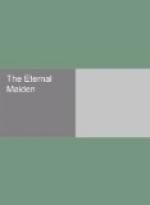The dread of it filled poor Annadoah’s heart. She quailed at the bitter execrations called upon her head. Instinctively her hand reached through the opening of her ahttee and she clutched at a piece of old half-decayed skin. This was a remnant of her mother’s father’s clothing, a amulet given her as a child, when saliva from the maternal grandfather’s mouth had been rubbed on her lips, and which she believed protected her from ill fortune.
“Io-ooh! io-oh!” Annadoah moaned in pain.
The women forgot their own tragedies. They forgot the messages they were imparting to the dead. Directly they might not be able to invoke any effective curse upon Annadoah; but well they knew, indeed, the awful power of the disembodied. And to the dead in the cold shuddering sea they told how Annadoah had played with the men, how she had betrayed them to the white traders, cajoling them to rob themselves of food, and how, because of her, famine now confronted the tribe; they told of the long devotion of Ootah, the desired of all the maidens, and how Annadoah had rejected him.
Possessed by a frantic contagion of released rage, their voices rose and fell in a frightful chanting malediction. In the weird gloom their vague forms leaped about, their arms writhing like black things in the air as they called the names of their individual dead to hear.
As their voices approached a crescendo they danced with increasing hysteria. Some shrieked and fell to the ice groaning, their bodies twisting in convulsions. Others laughed madly—laughed at the dreadful horrors with which the dead would smite Annadoah. Losing all control they were carried away by their delirious malevolence; their voices reached a high shrill pitch. Their arms clawed the air. Through the dead curses were invoked upon Olafaksoah, the great trader, who had cowed them and robbed them. They begged of the tornarssuit that he might be rended by wolves, that his body might rot unburied, and that the spirits of his limbs might be severed and be compelled to wander in restless torment forever. They called anathemas upon his unborn children; and of their dead, who should be imprisoned in darkness in the depths of the sea, they furiously invoked upon Annadoah’s offspring the curse of the long night . . . Their voices shuddered over the ice as they demanded that most dreadful of all dreaded evils—that Annadoah’s child might be born as blind to light and the joy of light as the dead in the sea.
Annadoah crouched in frantic terror upon the ice. From the Greenland highlands a moaning echo answered the women. To Annadoah the hill spirits had joined in cursing her—all nature seemed to upbraid her. Tremblingly, with a last lingering hope, she crept on her knees to the edge of the lane of lapping black water. She whispered a pathetic plea to Nerrvik, the gentle queen of the sea, whose hand had been severed by those she loved, and who felt great tenderness for men. Annadoah listened.




